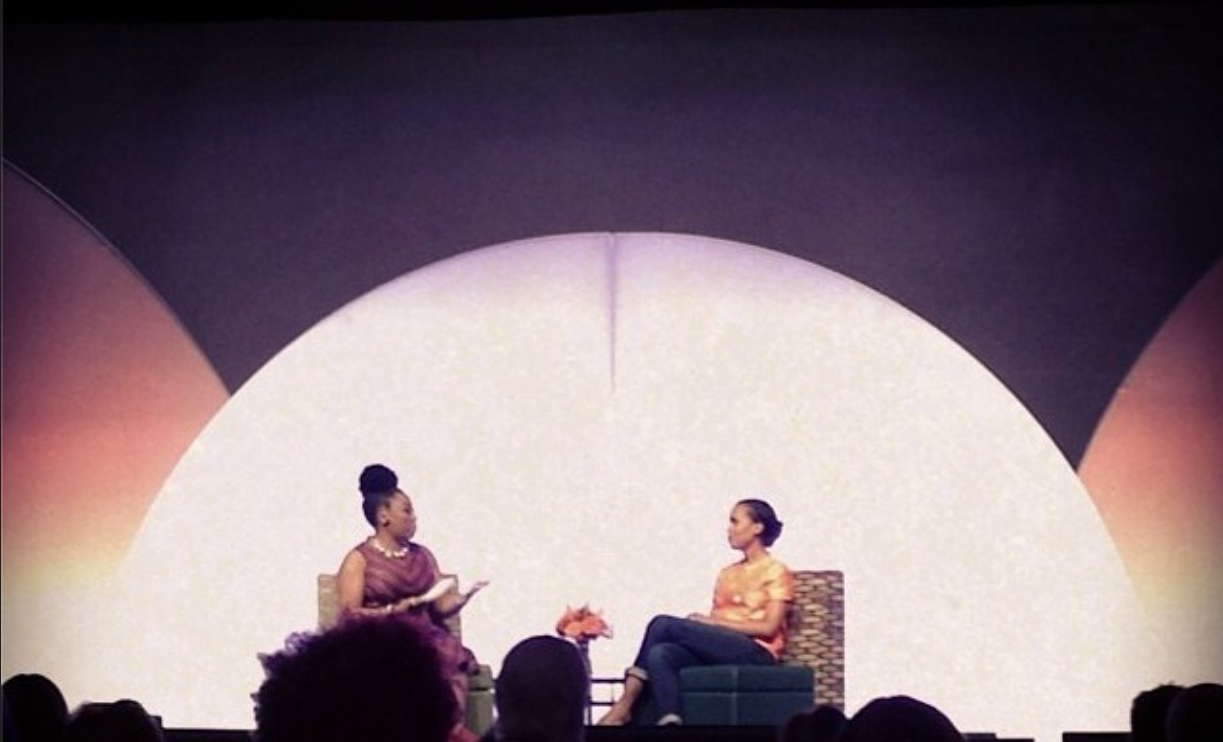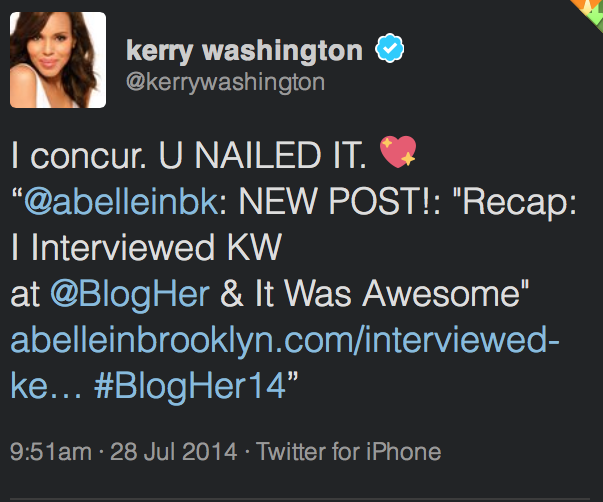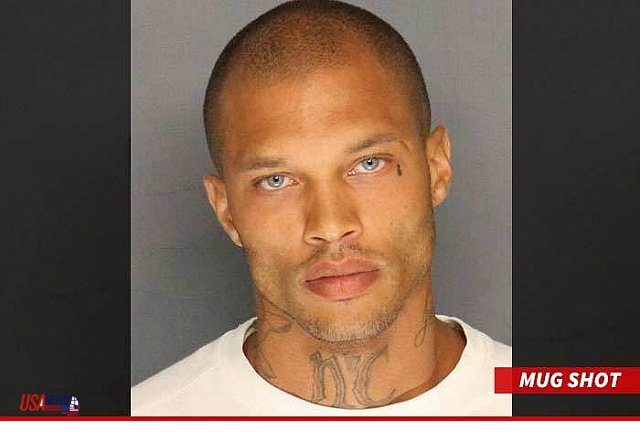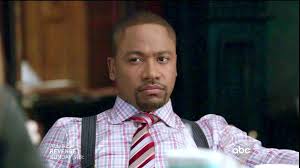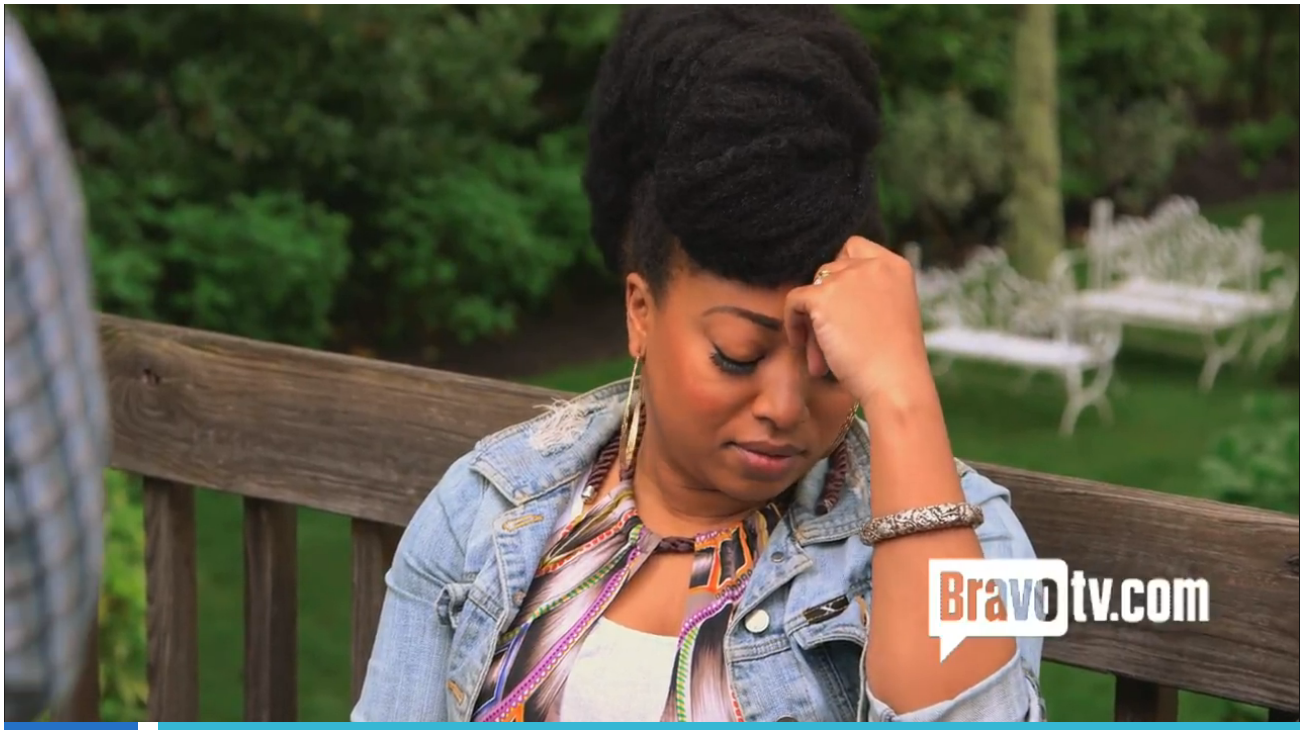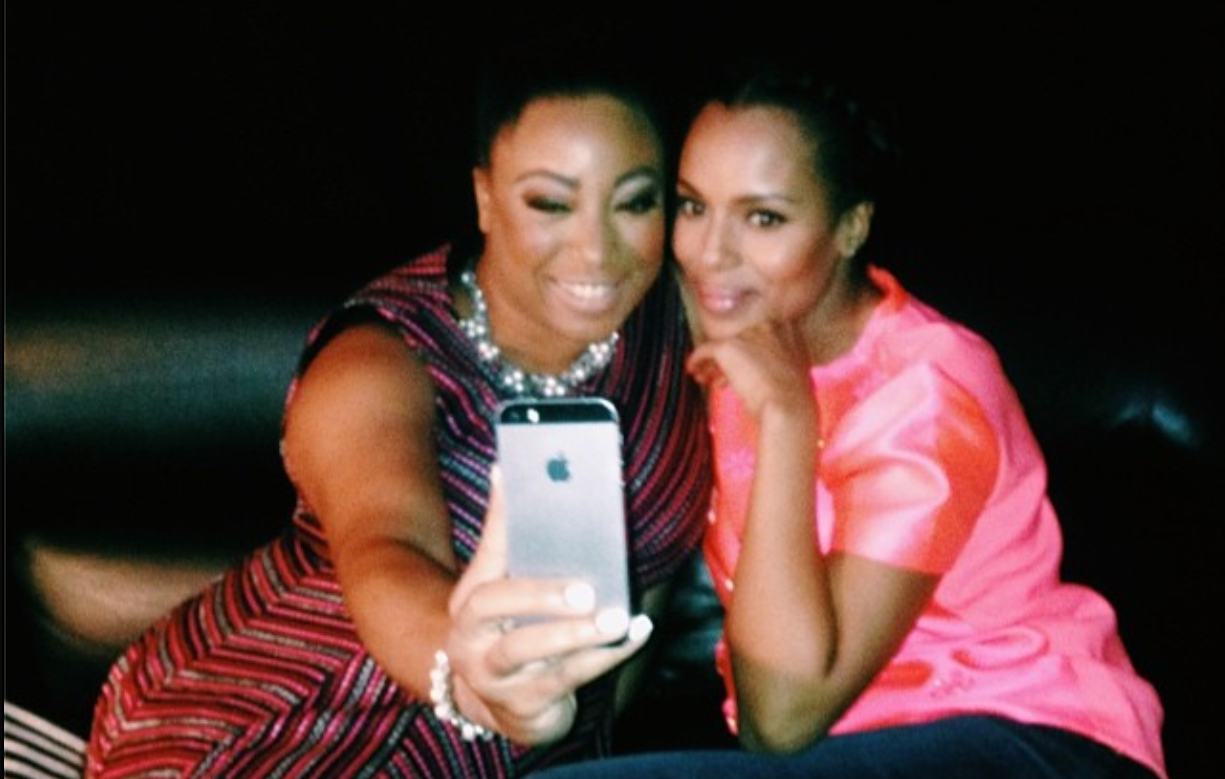 I’ve noticed a pattern lately. When I write about some aspect of my life, I find myself “saying”, “I don’t usually get nervous, but…” I‘m antsy a lot these days. I wasn’t sure if it was some reaction to beginning to think of myself as a real adult (and the contrasting feeling of not feeling like one) after my most recent birthday or something else.
I’ve noticed a pattern lately. When I write about some aspect of my life, I find myself “saying”, “I don’t usually get nervous, but…” I‘m antsy a lot these days. I wasn’t sure if it was some reaction to beginning to think of myself as a real adult (and the contrasting feeling of not feeling like one) after my most recent birthday or something else.
I sat and thought about it for awhile. It’s something else. I’m doing a lot of ish that I’ve never done before. Frankly, I’m out of my comfort zone. That’s good. I’m growing (not dying). But it also makes me well, nervous.
Sometime in early June, I was sitting in the Brooklyn coffee shop where I write everyday when I got an email from Allison Peters, Kerry Washington’s social media manager, asking that I give her a call. We met at SXSW in 2013. Allison introduced herself by saying she followed me on Twitter and was a fan of the blog. She was in Austin for a panel about “Scandal” and social media.
The e-mail sounded urgent. So I carried my iced coffee and my iPhone outside to lay on a bench and stare at the sky to contact her because this is how do business calls these days.
“Do you know your schedule for the end of July?” Allison asks once the pleasantries are out of the way.
There are a couple things on the table— Fashion Week in South Africa, NABJ in Boston, the Urban League conference in Cincinnati, a much-needed vacation to I-don’t-know-where, but-I–have-to-get-the-hell-out-of-here. But no contracts signed and no tickets bought yet.
“Nothing locked down. Why? What’s up?” I ask.
“Kerry is doing the keynote at BlogHer. Would you want to interview her?”
This is like asking, “When Jesus comes back, do you want to be in the 144?” Of course, I would want to interview Kerry Washington, but like as promo for her appearance at BlogHer? Or like at BlogHer? Eeek. I hadn’t planned on going this year.
“No, no,’ Allison explains. “Would you want to interview her on the main stage? A sit down interview with Kerry… for her keynote.”
Ohhhhhh!!!!! F**** yeah!!!!!!
What I say though is, “that sounds awesome. I’d love to make that happen.”
So she says the ladies from BlogHer will be in touch to set up the details, and if I could just send over my press kit and bio and she’ll take care of everything else.
We hang up and I call my manager and gush, “Ohmigod!!!!”, then call my publicist and do the exact same.
I lu-uh-uvvvv Kerry Washington, and I loved her in “I Think I Love My Wife” and “Last King of Scotland” and “Django”, but admittedly, I caught Kerry- fever, the Scandal equivalent of what I used to have for “Sex and the City” when she hit ABC prime time as the first black actress to lead a drama in my lifetime... which is f***ing crazy as I’m 35. Post- “Scandal” is when I started writing feel-good gushing articles about her like the one where I deemed her “The Queen of Repping Black Girls (with sense)”.
So the BlogHer ladies call, and the “details” are handled. Perfect.
And then what I just signed on for hits me, and I think, “OMG! What did I agree too?”
I’ve been a print/online journalist for 14 years now. I can interview anyone about anything if I have enough time to do the required research. And I always go hard researching because most people just read the press release and it annoys whoever you're interviewing. When you show up informed people will talk to you more and a whole lot longer than scheduled. That makes for a better interview and a better story.
The issue here is that I’m used to interviewing folks in more or less private—on the phone or a one-on-one sit down, often with a publicist nearby. The goal is always to have an interview that’s more like a conversation, again so people will get comfortable and tell you more, but if you miss an important query, you can always take a long pause (awkward silence) and circle back to get the information you need. The emphasis is on the information.
On stage (or TV), there’s less room for error. The flow has to be right, so does the pace. You’re trying to get information, but you also have to be entertaining. I mean, people are watching. I haven’t done an interview in front of a big audience—BlogHer is 3000— since 2011 at the Essence Music Festival (around 8000). I’m rusty.
I’ve done a fair amount of TV, but as of late, I’m the other side of the interview, answering instead of asking. I think about the content I want to share and how to present it, not what I want to gather and how. I’m on the easy side. All I have to do is answer. The interviewer controls the personality, the pace, and the program, or in the case of being on stage, the room. It’s not as simple as just throwing out questions.
So I spend the next few weeks in study mode, which means not only do I track down every major written story on Kerry Washington to find out the details of her backstory and what she’s been up to, I also watch all her major interviews. I want to know what she’s interested in and what makes her laugh and squirm. I overanalyze her personality to see how chatty she is to see how hard I have to work to get questions answered and make this a good interview. I’m also watching to see how the professionals – Ellen, Jimmy Kimmel, Queen Latifah, Oprah, etc.— pace their interviews and throw their questions so I can get it right, and potentially get Kerry to speak about her husband and daughter, which she’s notoriously private about. Getting an interviewee to open up about what they typically don’t is always the goal. Finally, I add her name to my Google alerts, so I’m up to date on all things Kerry.
I return from Panama on Wednesday. On Friday, I’m still exhausted, but BlogHer bound to San Jose for the big interview the next afternoon. I’m fueled on adrenaline.
Shortly after I get settled backstage on Saturday, in walks Kerry. It’s more than an hour ‘til showtime. Frankly, I wasn’t expecting her yet. Most major celebs will pop up at the absolute last minute. That, and right before they show up, there’s usually a sudden flurry of activity with people last-minute prepping to make sure everything is perfect for the celeb arrival. There’s none of that today.
Kerry just sort of appears with her publicist. She’s dressed Saturday casual in a cute pink top, jeans and sky-high black Loubs pumps. And she gives off the vibe of your best girlfriend, the one who you admire for her grace and always being (or seeming) effortlessly together. We hug “hello” and after greeting the organizers, she perches on the edge of the leather sofa and strikes up a convo with me. She knows about my trip to Panama, and asks if I’m doing Season Two of [The Show], which means she either reads my blog or follows me on Instagram. The person I’ve been studying has also been studying me. Go figure.
We talk a bit about how she’s juggling being a wife and mom. (I won’t give you deets because it wasn’t part of the interview, but I will say that though less guarded than she is in interviews, she’s still guarded. I am a journalist after all, and most celebs don’t trust us.)
There are two speakers set to go on before us. While the first is on stage, I use the downtime to go over my (long) outline. I thought we had an hour, we actually have 40 minutes, including a Q&A with the audience. I need to re-pace, cut out the clutter. I’ve got more than enough time, twenty minutes… or not.
One of the BlogHer organizers comes up to say they’re switching the pace. We’re up next. The second speaker (my blogger homie Luvvie Ajayi) will go after us now. We’ll take the stage as soon as the current speaker is up… in about 3 minutes.
Uh… ok.
The reaction to the interview was overwhelmingly positive. I felt good about it and I’m a hard critic on myself, so I’m going to go ahead and say I nailed it. I didn't get her to open up about her husband, but there were a couple cute moments where she heard a baby cry in the audience and started looking around. She joked about being a new mother and having an instinctual reaction.
UPDATE: Kerry Washington has spoken:
Here are the (edited) highlights of the interview (courtesy of BlogHer):
Demetria Lucas: Scandal returns on September 25. Can you tell us anything at all about season 4?
Kerry Washington: Well, I now know where the plane was going. I wish I could tell you cause it's really good. The way the last season ended with Olivia Pope is kind of what you would do to a character you were writing off of the show. I was a little concerned but I am still on the show which is good. It is like a reset button has been pushed. Last season, I feel like Olivia stepped away from it all to try to take some control over her life. So the new season picks up here.
DL: How do you balance your privacy with social media?
Kerry: I think it's ever evolving. Sometimes I tweet about my parents because I can't resist. I do tweet about my dog but not my marriage or my kids. As an actor, I feel like it's harder to lose yourself in my work if you know too much about me. You may have to do a little more work as an audience member to dive into my relationship with my coworkers. I like to keep my life a mystery so you can enjoy the story more.
DL: I think it makes you more interesting. As an audience, we still do appreciate actors who hold a bit more back.
KW: The fact that I don't share it doesn't mean it's more interesting. It's a lie. I'm incredibly boring. [Laughs]
DL: How do you deal with some of the backlash about the image of a black woman in Scandal?
Kerry: I think my job as an actor is to embody humanity. I often felt a lot of fulfillment by taking a character that someone may have thought of as a stereotype and infusing that character with as much humanity as possible. As an actor, I'm given the honor of giving you an inside look into that person's life and their heart. Stories of a homeless woman or a drug addict, as an actor, I can force you to feel for them by letting you into their life, into their mind. I think every human being has value, I never think it's ok to think a character is worthless because of something they have done. Part of being a Black woman and being able to work, means I get to tell stories about people we don't always pay attention to.
DL: How do you deal with the negative comments on social media?
KW: I don't weigh myself because there's never a good answer on the scale. For me reading comments is the same way. It's brain clutter. But it is hard, in social media you feel like you're a community. People in social media can be very mean. Some of our cast members have struggled it a lot. Sometimes people come to social media to find a community, a sense of belonging, a place where they feel like they can empower themselves. Often that can be a positive place. Sometimes it's done in really negative ways by building community through judgment and criticism and a holier than thou attitude. I have to protect myself from that because it's sort of high school. As much as I want to be part of that community, I don’t look to the social media community to affirm my work.
DL: How do you choose your roles?
KW: My roles have been all over the place. Up until Scandal, I've had a really full and rich career. I prided myself on disappearing into the character. People don't tie one character into the other. Scandal has changed that, because there's no disappearing. I'm in people's houses at the same time every week. For me the way I choose my work is the material. It's all in the page and the writing. Wanting to work with the writing and the directing, and immense talent.
DL: The number one overwhelming question I got for you from social media is, does she get to keep the clothes?
KW: Um…No. We didn't want the fashion on the show to be fake, where very episode has new episodes. I wanted the clothes to be amazing because I felt like this kind of women would have a global aesthetic but I wanted her to have a real closet. Every single episode has an item you've seen before. Often, 2 or 3 reused items. So there's a very big Olivia Pope closet. People tell me all the time I want her clothes, and I say, “me too!” I wish I could afford her clothes.
DL: How do you find the balance with your family, the show, and promotional activities? Where do you find time?
KW: I'm exhausted. But I feel we can all relate to that. Women are all natural multi taskers and even if we're not, we figure it out. The mom part is new to me so I don't know yet what the balance is like. I go back to work on Monday. Up to this point, it's been really important for me to ask for help and say when I don't know and to be part of a community of women. It's been an amazing experience for me to have a woman like Shonda Rhimes and her partner Betsy Beers as my bosses. I benefit from having a woman boss in ways that are even hard for me to articulate. It is so tremendous to work for a woman. Every time we don't step into a leadership role, we are robbing somebody. I bring it up because Shonda has taught me a lot about balance. She's got 3 kids and 3 shows. She has tremendous power and she wields her power with grace and responsibility, I learn a lot from her. We'll see how it goes.
DL: Who are your mentors in this business?
KW: I have heroes, Cicely Tyson, Diahann Carroll, and Barbara Streisand. People who say that they don't fit [like] Jane Fonda, Shaunda Rhymes. The movie “9 to 5” resulted in the union for administrative assistants because it brought to light the need for union because of abuse in the workplace of women. So Jane Fonda is a real mentor of mine.
DL: Do you have a dream role?
KW: No, I don't have a dream role. My mentors are ones who haven't allowed age to stop them. So for me, I don't have a dream role because I feel like the bar keeps moving. Maybe I'm scared to have a dream role because I feel like I'll have to retire after that.
Full transcript: HERE
Right before the interview got started, I joked that we should have brought our phones to the stage to take a picture of the audience. Kerry’s PR brought hers to her and I suggested she take a crowd selfie, or er, “usie”? It turned out awesome.
